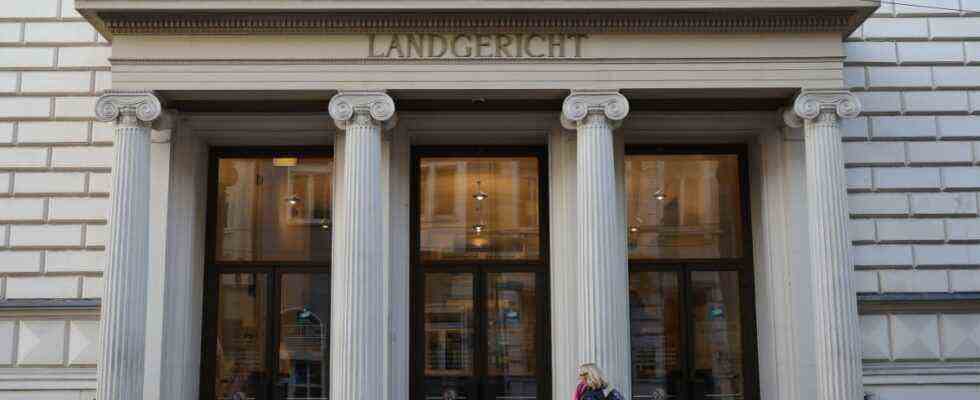The defendant M. is like a changed man that day. Last Monday he tried to cross-examine himself. But this Wednesday, the former Warburg manager surprisingly gives in and confesses some of the allegations. For years he had “glossed over” the events in order to justify his actions to himself, “to others and also to the judiciary. That was wrong,” said the bald man and horn-rimmed glasses in front of the Bonn district court.
He “closed his eyes” and “worried about my career” postponed his concerns about the deals he is charged with today. Then he adds: “I deeply regret having created an essential prerequisite for the execution of the transactions discussed here and the immense tax damage caused by this.”
These words mark a spectacular U-turn in the current cum-ex trial at the Bonn Regional Court – and could have far-reaching consequences. Because with this statement, a former or current Warburg employee breaks the previously iron line of the Warburg owners around Christian Olearius and Max Warburg for the first time. The two of you and the bank deny having ever acted illegally. Until now, all those accused in the Warburg case were loyal to one another; in the first trial against a former Warburg banker, the defense was completely geared towards confrontation. The statements of the accused ex-manager M. now crumble the line of defense for the first time.
More than 100 million euros in alleged tax damage
It is the third Cum-Ex criminal case at the Bonn Regional Court, and for the third time the Hamburg private bank MM Warburg is in the spotlight. The accused is M., the former managing director of Warburg Invest, a subsidiary that sets up and manages investment funds. In the years up to 2010, this also included funds that were used for cum-ex deals. With these, bankers, lawyers, and financial institutions have traded stocks for years before and after the dividend cut-off date. They had previously unpaid capital gains tax reimbursed, thereby easing the tax authorities by an estimated ten billion euros.
Such cum-ex deals were criminal tax evasion, ruled the Federal Court of Justice (BGH) in the summer of 2021. With the two funds in the current process alone, the tax authorities are said to have been defrauded by more than 100 million euros at the time.
Since the beginning of the investigation, Warburg and the owners of the bank have been defending themselves against accusations of deliberately evading taxes. The defendant M. also represented it for a long time. And this turnaround was not to be expected up to and including Monday: In court, the man initially stated that he had studied mathematics, learned programming and actually wanted to do a doctorate at an early age. When that failed because of his professor, he went into the private sector and was initially employed in IT before he ended up at Warburg Invest around the turn of the millennium. Over the years he was promoted to managing director there. The judge described the trained mathematician M. as a “risk analyst”. When he sent emails that he had previously announced, he apparently liked to write: “As threatened.”
M. repeatedly denied in court that he knew what was going on at the time. He said two days before his U-turn, he had no idea about agreements between dealers, bankers and other parties involved, for example – which from today’s perspective were elementary for the cum-ex business. The judges in this third criminal case, however, were dissatisfied with the accused’s testimony.
“Just tell us how it was”
In a round of questions they tore up the statements of the fund professional and revealed several inconsistencies, including about agreements and his level of knowledge in the important years 2009 and 2010. When the defendant’s attempts to explain were not enough for him, the presiding judge Roland Zickler became clear: He threw M. emphatically suggests that his statements are implausible, that the role of the clueless does not suit him, that he should stop considering the court to be naive. “Just tell us how it was,” said Zickler.
Apparently his words worked. The court’s inquiries, the defendant says, led him to reflect on what was going on from 2009 onwards. Apparently he himself decided to take this new view to court, and not his team of four lawyers.
And so this Wednesday he is revising many previous statements. In fact, he had a feeling of disturbance early on, which he pushed aside. But he didn’t act, he says. This was due, on the one hand, to pressure from the advising lawyers and, on the other hand, to pressure within the Warburg Group. After all, the business relationship between Hanno Berger and Paul Mora made a significant contribution to the bank’s earnings, adds the defendant. Today Berger is seen as a driving force behind the deals, Mora is sought after internationally because of such cum-ex deals. Both deny the allegations made against them.
More than just a surprise
Out of concern for his career, M. emphasizes, he put his concerns about tax-driven business aside, also because he had previously had bad experiences with opposing opinions within the Warburg Group. As a result, business with the funds ran not only in 2009 but also in 2010. He was involved in it and, among other things, contributed to the “veiling” through his work. He regrets that today, says M. on Wednesday.
These new statements seem to have made an impression. After the presiding judge Zickler had attacked the accused sharply on Monday, he showed himself to be mildly tempered after his testimony on Wednesday. He postponed what was probably a tough new round of questions with a view to the new statements and said directly to the defendant M.: “You have done yourself one of the greatest favors that a person can do himself.”

